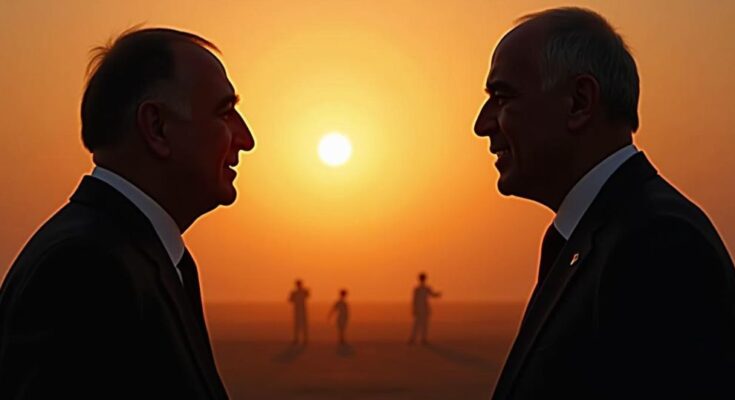Lebanese Foreign Minister Abdallah Bou Habib claims that former Hezbollah leader Hassan Nasrallah and Israeli Prime Minister Benjamin Netanyahu agreed to a ceasefire shortly before Nasrallah’s fatal airstrike. This agreement was reportedly communicated to U.S. and French officials. Following the ceasefire proposal rejection by Netanyahu, Israel continues military actions against Hezbollah, with significant casualties reported in the ongoing conflict.
In a startling revelation, the Lebanese Foreign Minister, Abdallah Bou Habib, stated that former Hezbollah leader Hassan Nasrallah and Israeli Prime Minister Benjamin Netanyahu reached a ceasefire agreement shortly before Nasrallah’s death in a recent airstrike in Beirut. Speaking to a U.S. public broadcaster, Bou Habib confirmed that both leaders had communicated this agreement to representatives from the United States and France. On September 27, an Israeli strike targeted Nasrallah’s bunker located in Dahiyeh, resulting in his demise. While Hezbollah’s official statement on his death did not provide specific details regarding the cause, multiple reports suggest that he succumbed to blunt force trauma rather than direct injuries from the bombing. Bou Habib conveyed, “He (Nasrallah) agreed, he agreed (to the ceasefire),” indicating that Lebanon had secured comprehensive consent for the ceasefire from Hezbollah and had duly informed American and French officials of the agreement. He remarked, “The Lebanese House Speaker, Mr. Nabih Berri, consulted with Hezbollah and we informed the Americans and the French about the agreement. They told us that [Israeli Prime Minister Benjamin] Netanyahu also agreed to the statement issued by both presidents.” Despite this truce, Netanyahu rejected the proposed ceasefire on September 26, delegating continued military engagement against Hezbollah. The tense backdrop of this conflict escalated following a historic 21-day ceasefire announcement by the United States and France, initiated on September 25 at the UN General Assembly. Furthermore, it has been reported that Iran’s Supreme Leader, Ayatollah Ali Khamenei, had warned Nasrallah to evacuate Lebanon just prior to the strike, citing intelligence asserting that Israel might seek to assassinate him. This warning was delivered by a high-ranking Iranian Revolutionary Guards official, Brigadier General Abbas Nilforoushan, who unfortunately perished alongside Nasrallah in the attack. In the wake of these incidents, Israel has initiated what it is labeling a “limited” ground operation in southern Lebanon. As recent casualties reflect, over 1,900 individuals have been killed, and approximately 9,000 injured since the outbreak of hostilities following Hamas’s attack on Israeli territory on October 7 of the previous year. The conflict continues to evolve, marking a deeply turbulent period in Lebanese and Israeli relations.
The article discusses a recent event where the Lebanese Foreign Minister claimed that a ceasefire agreement between Hezbollah and Israel was reached before the death of Hezbollah leader Hassan Nasrallah. The backdrop of this statement includes ongoing tensions and hostilities between Israel and Hezbollah, exacerbated by the larger regional conflict involving Hamas and military actions taken by Israel. The involvement of foreign leaders, such as U.S. President Joe Biden and French President Emmanuel Macron, in facilitating ceasefire discussions reveals the international dimensions of this conflict. The report also highlights internal Iranian concerns regarding Hezbollah’s leadership and the security risks faced by Nasrallah, indicating a complex interplay of local and foreign influences in this conflict.
In conclusion, the alleged ceasefire agreement between Hassan Nasrallah and Benjamin Netanyahu prior to Nasrallah’s death underscores the fragile nature of peace negotiations amid ongoing hostilities. The situation remains critical, with significant casualties reported and military actions continuing. The international community’s involvement further complicates the dynamics at play, indicating a need for careful diplomatic engagement moving forward.
Original Source: www.ndtv.com




